Animalia

Snow Goose
Chen caerulescens

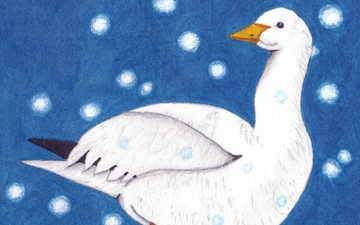
Sorry, there is no photo available. If you have one, please submit
here
.
5 POINTS
• Chen caerulescens has a MOVE of 3.
Chen caerulescens can live for 26 years in the wild.
Cool, Warm
Graphic by artemylartemyl.deviantart.com/
The Snow Goose (Chen caerulescens), also known as the Blue Goose, is a North American species of goose. Its name derives from the typically white plumage. The genus of this bird is disputed. The American Ornithologists’ Union and BirdLife International place this species and the other “white” geese in the Chen genus,[1] while other authorities place it in the more traditional “grey” goose genus Anser.[2] […] read more

Mandrill
Mandrillus sphinx

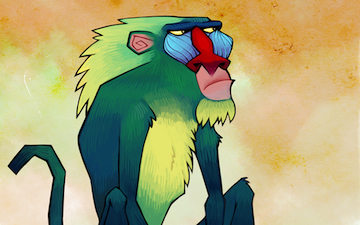
Sorry, there is no photo available. If you have one, please submit
here
.
6 POINTS
Play: Mandrillus sphinx has a MOVE of 2.
Fact: The mandrill is recognized by its olive-colored fur and the colorful face and rump of males.
warm, hot
Graphic by Alexandra Prillamanmytholalia.com/
The mandrill (Mandrillus sphinx) is a primate of the Cercopithecidae (Old-world monkeys) family,[3] closely related to the baboons and even more closely to the Drill. Both the mandrill and the drill were once classified as baboons in genus Papio, but recent research has determined that they should be separated into their own genus, Mandrillus.[3] The […] read more

Reindeer
Rangifer tarandus


Sorry, there is no photo available. If you have one, please submit
here
.
6 POINTS
• Rangifer tarandus has a MOVE of 2.
Santa Claus’ sleigh is pulled by flying reindeer.
Cold, Cool
Graphic by Katie Thierolfwolfyu.deviantart.com/
The reindeer (Rangifer tarandus), also known as the caribou in North America, is a deer from the Arctic and Subarctic, including both resident and migratory populations. While overall widespread and numerous,[1] some of its subspecies are rare and one (or two, depending on taxonomy) has already gone extinct.[2][3] Reindeer vary considerably in color and size,[4] […] read more

Polar Bear
Ursus maritimus

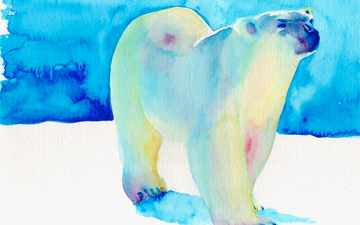
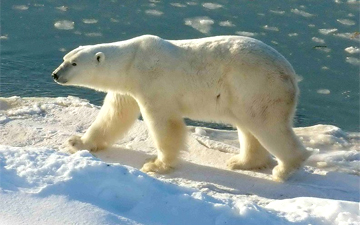
10 POINTS
Play: Ursus maritimus has a MOVE of 2.
Fact: Many leading polar bear biologists have expressed grave concerns about the impact of climate change on the survival of this species.
cold
Graphic by Ashley Navaquicksilvercreatures.wordpress.com/
Photo by Ansgar Walken.wikipedia.org/wiki/File:Polar_Bear_2004-11-15.jpg
The polar bear (Ursus maritimus) is a bear native largely within the Arctic circle encompassing the Arctic Ocean, its surrounding seas and surrounding land masses. It is the world’s largest land carnivore and also the largest bear, together with the omnivorous Kodiak bear, which is approximately the same size.[3] An adult male weighs around 350–680 […] read more

European Robin
Erithacus rubecula

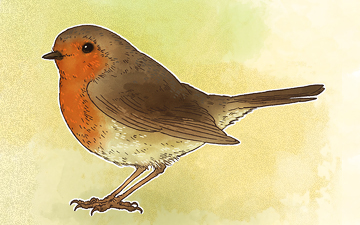
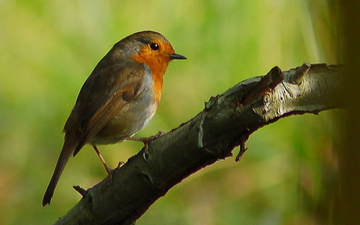
2 POINTS • Erithacus Rubecula has a FLIGHT of 2. “In Britain the robin is closely associated with Christmas.”
Cold, Cool, Warm
Graphic by Celeste Agnesslightly.weirdly.net
Photo by Isidro Vila Verdewww.flickr.com/photos/jvverde/
The European Robin (Erithacus rubecula), most commonly known in Anglophone Europe simply as the Robin, is a small insectivorous passerine bird that was formerly classed as a member of the thrush family (Turdidae), but is now considered to be an Old World flycatcher (Muscicapidae). Around 12.5–14.0 cm (5.0–5.5 in) in length, the male and female […] read more

Arctic Fox
Alopex lagopus

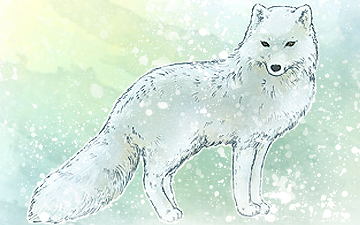
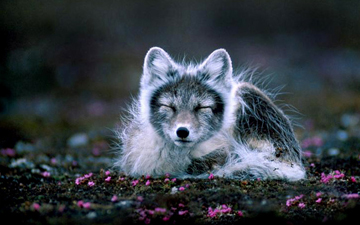
5 POINTS
• Alopex lagopus has a MOVE of 2.
• Alopex lagopus lives farther north than any other land mammal.
Cold, Cool
Graphic by Celeste Agnesslightly.weirdly.net
Photo by Per Harald Olsenen.wikipedia.org/wiki/File:Fjellrev_pho.jpg
The Arctic Fox (Alopex lagopus or Vulpes lagopus[2]), also known as the White Fox, Polar Fox or Snow Fox, is a small fox native to cold Arctic regions of the Northern Hemisphere and is common throughout the Arctic tundra biome. The Greek word alopex, (ἀλώπηξ) means a fox and Vulpes is the Latin version. Lagopus […] read more